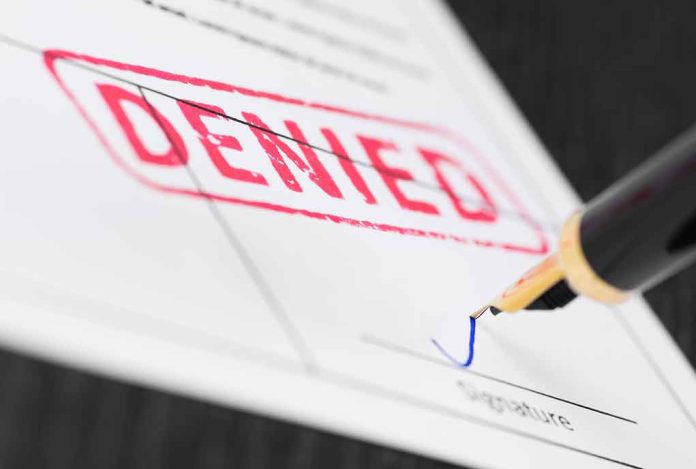
A federal judge has denied the District of Columbia’s motion to dismiss a lawsuit challenging its practice of sending armed police officers to respond to mental health emergencies.
At a Glance
- U.S. District Judge Ana Reyes ruled that the lawsuit can proceed, finding that the plaintiff plausibly argued harm from DC’s practices.
- The lawsuit, filed by the ACLU on behalf of Bread for the City, claims DC’s approach violates the Americans with Disabilities Act (ADA) and Rehabilitation Act.
- Less than 1% of 911 calls involving mental health emergencies in DC receive a response from a mental health professional.
- The Department of Justice supports the claim that DC’s reliance on police officers for mental health crises violates the ADA.
Judge Allows Lawsuit to Proceed
U.S. District Judge Ana Reyes has rejected the District of Columbia’s request to dismiss a lawsuit challenging its practice of sending armed police officers to respond to mental health emergencies. The lawsuit, filed by the American Civil Liberties Union (ACLU) and Sheppard Mullin on behalf of Bread for the City, a nonprofit supporting underserved communities, alleges that DC’s approach discriminates against individuals with mental health disabilities.
Judge Reyes found that the plaintiff had plausibly argued harm from the city’s practices. The lawsuit claims that DC’s approach violates the Americans with Disabilities Act (ADA) and the Rehabilitation Act, which prohibit discrimination against individuals with disabilities in public services and federally funded programs.
Concerns Over Mental Health Crisis Response
The lawsuit highlights significant concerns about the District’s handling of mental health emergencies. According to the complaint, less than 1% of 911 calls involving mental health emergencies in DC receive a response from a mental health professional. This stark contrast in emergency response practices has raised questions about the equity and effectiveness of the city’s approach to mental health crises.
“When D.C. residents experience physical health emergencies—such as asthmatic or diabetic crises—calling 911 results in the prompt arrival of paramedics or emergency medical technicians (EMTs) who are specially trained to address the crisis,” the lawsuit states.
The lawsuit further notes that while DC employs community response teams (CRTs), these teams lack sufficient funding, training, and coordination. This deficiency in resources and preparation arguably contributes to the disproportionate reliance on police officers for mental health-related calls.
Department of Justice Backs Lawsuit
In a significant development, the U.S. Department of Justice (DOJ) has thrown its support behind the lawsuit. The DOJ’s stance lends credence to the claim that DC’s heavy reliance on police officers for mental health crisis response violates the ADA. This federal backing underscores the national importance of addressing the intersection of law enforcement and mental health crisis management.
“It is a reasonable inference from Bread’s allegations that people with mental health disabilities do not meaningfully benefit from the district’s emergency response,” Judge Ana C. Reyes said during a Sep. 10 hearing denying the district’s request to dismiss the lawsuit. “For all those reasons, I conclude that Bread has plausibly alleged that individuals with mental health disabilities are denied the benefit of the district’s emergency response system.”
The District has argued that it is already taking steps to enhance its mental health emergency response system. However, the judge’s decision to allow the lawsuit to proceed suggests that these efforts may not be sufficient to address the concerns raised by the plaintiffs.
Looking Ahead
With the lawsuit now moving forward, both parties are engaged in ongoing mediation meetings to potentially settle the case. Future mediation sessions are proposed for September 24 and 29. The next court date is scheduled for October 30, with ongoing discovery and settlement conferences.
“This ruling moves us one step closer to bringing essential, life-saving emergency mental health care to D.C. communities,” Ashoka Verriest from the ACLU’s Criminal Law Reform Project said. “Qualified providers are best equipped to handle mental health emergencies with skills and compassion; police with a gun only serve to escalate, handcuff and arrest.”
As this case progresses, it has the potential to set a significant precedent for how cities across the nation approach mental health crisis response. The outcome could lead to substantial reforms in emergency services, prioritizing mental health expertise over traditional law enforcement approaches in situations involving individuals experiencing mental health crises.
Sources:
- Federal judge rejects DC request to dismiss mental health crisis lawsuit
- Judge Rejects DC Effort to Dismiss Lawsuit Challenging Response to Mental Health Emergencies
- D.C. Can’t Dismiss Lawsuit Over Police Response to Mental Health Crises
- Lawsuit Challenging Armed Police Response to Mental Health Emergencies in Washington, D.C. to Proceed
- Federal judge slams DC for refusing outside help on mental health crisis
- D.C. ACLU Sues City For Sending Armed Police To Mental Health Emergencies







